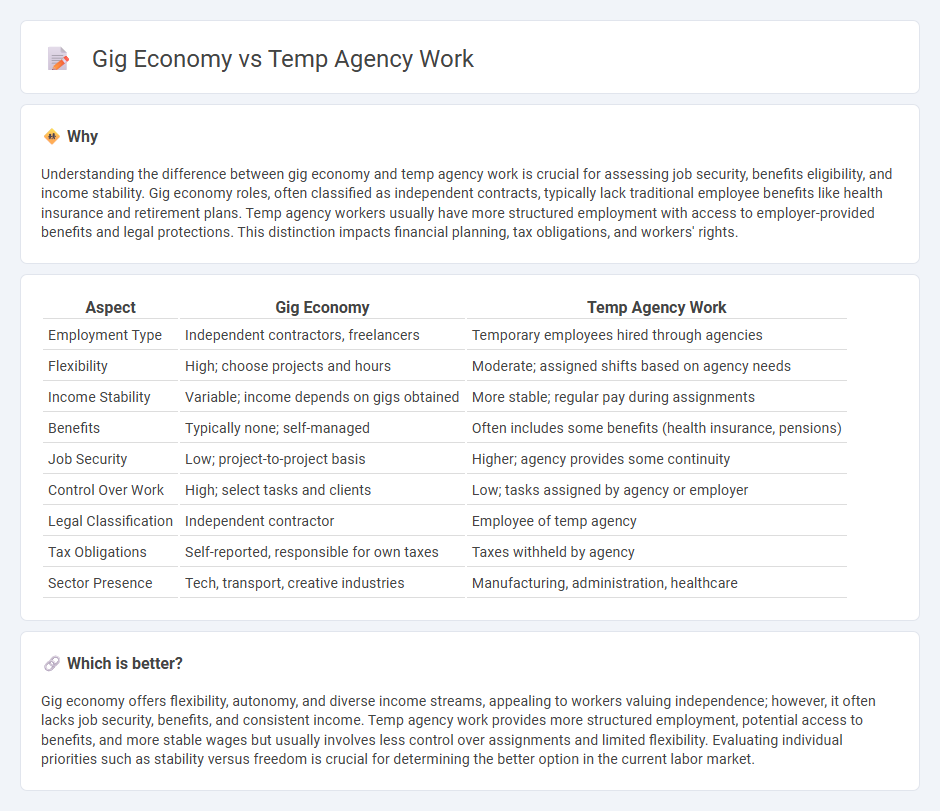
The gig economy offers flexible, short-term jobs driven by digital platforms, allowing workers to choose projects and schedules without long-term commitments. In contrast, temp agency work involves staffing firms that match employees to temporary positions, often providing more structured assignments and possible benefits. Explore the advantages and challenges of each work model to find which suits your career goals best.
Why it is important
Understanding the difference between gig economy and temp agency work is crucial for assessing job security, benefits eligibility, and income stability. Gig economy roles, often classified as independent contracts, typically lack traditional employee benefits like health insurance and retirement plans. Temp agency workers usually have more structured employment with access to employer-provided benefits and legal protections. This distinction impacts financial planning, tax obligations, and workers' rights.
Comparison Table
| Aspect | Gig Economy | Temp Agency Work |
|---|---|---|
| Employment Type | Independent contractors, freelancers | Temporary employees hired through agencies |
| Flexibility | High; choose projects and hours | Moderate; assigned shifts based on agency needs |
| Income Stability | Variable; income depends on gigs obtained | More stable; regular pay during assignments |
| Benefits | Typically none; self-managed | Often includes some benefits (health insurance, pensions) |
| Job Security | Low; project-to-project basis | Higher; agency provides some continuity |
| Control Over Work | High; select tasks and clients | Low; tasks assigned by agency or employer |
| Legal Classification | Independent contractor | Employee of temp agency |
| Tax Obligations | Self-reported, responsible for own taxes | Taxes withheld by agency |
| Sector Presence | Tech, transport, creative industries | Manufacturing, administration, healthcare |
Which is better?
Gig economy offers flexibility, autonomy, and diverse income streams, appealing to workers valuing independence; however, it often lacks job security, benefits, and consistent income. Temp agency work provides more structured employment, potential access to benefits, and more stable wages but usually involves less control over assignments and limited flexibility. Evaluating individual priorities such as stability versus freedom is crucial for determining the better option in the current labor market.
Connection
The gig economy and temp agency work both provide flexible employment opportunities by connecting workers with short-term or project-based jobs. Gig platforms and temp agencies act as intermediaries, matching labor supply with demand across various industries such as healthcare, IT, and hospitality. This connection facilitates on-demand workforce solutions that help businesses reduce costs while offering workers autonomy and varied income sources.
Key Terms
Employment Contracts
Temp agency work is governed by fixed-term or project-specific employment contracts directly between the worker and the agency, ensuring legal protections such as minimum wage, benefits, and regulated working hours. In contrast, gig economy roles often rely on independent contractor agreements, which typically lack traditional employment benefits and can create ambiguity around labor rights and protections. Explore the differences in contractual obligations and worker rights to better understand which option suits your employment needs.
Flexibility
Temp agency work offers structured flexibility with scheduled shifts and guaranteed pay, allowing workers to balance stability and adaptability. Gig economy tasks provide on-demand, highly flexible opportunities but often come with income variability and less job security. Explore more to understand which option best suits your lifestyle and financial needs.
Income Stability
Temp agency work often provides a more consistent income through scheduled shifts and employer-guaranteed hours, while gig economy jobs rely on task availability, leading to variable earnings that fluctuate daily or weekly. Temp agencies may also offer benefits such as healthcare and unemployment protections, contributing to overall financial security absent in most gig roles. Explore the comparison in detail to understand which option aligns best with your income stability needs.
Source and External Links
Adecco Staffing: Temporary, Temp to Hire, and Direct Hire Jobs - Adecco offers over 100,000 job opportunities worldwide including temporary work, managing everything from candidate search to payroll and digital onboarding.
Labor Finders: Staffing and Temp Agency - Labor Finders has provided temp and permanent job placements since 1975, focusing on flexible jobs that can fit around your life with new postings daily.
AtWork: Professional Staffing and Recruiting Agency - AtWork specializes in temporary, temp-to-hire, and direct hire staffing, helping job seekers quickly find roles where they can use or build skills while supporting employers with vetted candidates.
 dowidth.com
dowidth.com